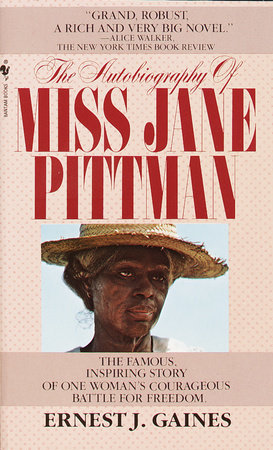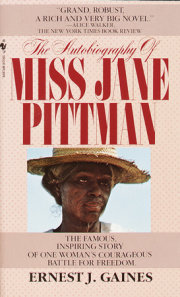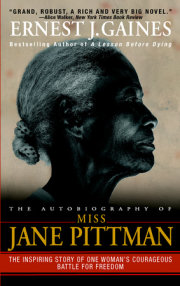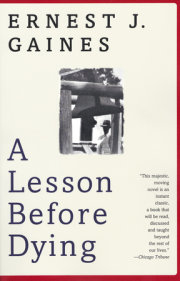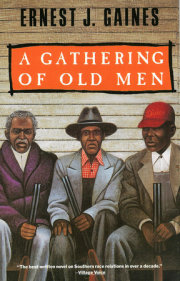Soldiers
It was a day something like right now, dry, hot, and dusty dusty. It might 'a' been July, I'm not too sure, but it was July or August. Burning up, I won't ever forget. The Secesh Army, they came by first. The Officers on their horses, the Troops walking, some of them dragging the guns in the dust they was so tired. The Officers rode up in the yard, and my mistress told them to get down and come in. The colonel said he couldn't come in, he was going somewhere in a hurry, but he would be glad to get down and stretch his legs if the good lady of the house would be so gracious to let him. My mistress said she most graciously did, and after the colonel had got down he told the others to get down, too. The colonel was a little man with a gun and a sable. The sable was so long it almost dragged on the ground. Looked like the colonel was a little boy who had got somebody else's sable to play with. My mistress told me stop standing there gaping, go out there in the road and give the Troops some water. I had the water in a barrel under one of the chinaball trees. We knowed the soldiers was coming that way—we had heard the gun fire the day before, and somebody had already passed the house and told us if the soldiers came by be prepared to help in every way we could; so they had put me to hauling water. All morning long I hauled water to that barrel. Now I had to haul the water out the barrel to the Troops out in the road. Buckets after buckets after buckets. I can't remember how many buckets I hauled. The Troops was so tired and ragged they didn't even see me. They took the gourd from me when I handed it to them, and that was all. After they had drunk, they just let it hang there in their hands, and I had to reach and get it so I could serve another one. But they didn't even see little old black me. They couldn't tell if I was white or black, a boy or a girl. They didn't even care what I was. One was just griping. He didn't look too much older than me—face just as dirty as it could be. Just griping: "Just left to me I'll turn them niggers loose, just left to me." When I handed him the water he held the gourd a long time before he drank, then after he had drunk he let the gourd hang in his hand while he just sat there gazing down at the ground.
But these was the same ones, mind you, who had told their people they wouldn't be late for supper. That was before—when the war was just getting started—when they thought fighting a war was nothing but another day's work. "Don't put my food up," they said. "Don't put it up and don't give it away. I'm go'n kill me up a few Yankees and I'm coming right on back home. Who they think they is trying to destruck us way of living? We the nobles, not them. God put us here to live the way we want live, that's in the Bible." (I have asked people to find that in the Bible for me, but no one's found it yet.) "And He put niggers here to see us live that way—that's in the Bible, too. John, chapter so and so. Verse, right now I forget. Now, here them Yankees want come and destruck what the Good Lord done said we can have. Keep my supper warm, Mama, I'll be back before breakfast." These was the same ones griping out in the road right now.
Before all them had a chance to get some water, I looked up and saw another one coming down the road on a horse. He was hitting and kicking that horse fast as his arms and feet could move. Hollering far as you could hear him: "Colonel, Colonel, they coming. Colonel, Colonel, they coming." He went right by us, but the Troops was so tired some of them didn't even raise their head. Some of them even laid down on the ground when he went by. "How far?" the colonel asked him. "I don't know for sure," he said. "Maybe three, four miles back there. All I can see is that dust way up in the air." My mistress handed him two biscuits and a cup of water. He looked at that bread and water like he hadn't seen food or water in a long time and he kept bowing and saying, "Thank you, ma'am; thank you, ma'am; thank you, ma'am." The colonel hit his boots together and kissed my mistress on the hand, then he told the others to get on their horses. He hollered for them in the road to get to their feet, too. Some of them did like he said, but many of them just sat there gazing down at the ground. One of the Officers had to come out in the road and call them to attention. Even then they wasn't in any kind of hurry to get on their feet. They started down the road, and I could hear that same one that had been griping before: "Just left to me I'll turn them niggers loose, just left to me." One of the other Troops told him shut up before he got both of them shot. Him for complaining, and him for being his cousin. He told him shut up or cousin or no cousin he liable to shoot him himself. But till they got out hearing distance all I could hear was that little fellow griping: "Yankees want them, let the Yankees have them—just left to me."
After they had made the bend, I went back in the yard with the bucket and the gourd. My mistress was standing on the gallery watching the dust rising over the field, and just crying. "Sweet, precious blood of the South; sweet, precious blood of the South." Just watching that dust, wringing her hands and crying. Then she saw me standing there looking up at her. "What you standing there for?" she said. "Go fill that barrel."
"What for, Mistress?" I said. "Theygone now."
"Don't you think Yankees drink?" she said. "Go get that water."
"I got to haul water for old Yankees, too?" I said.
"Yes," she said. "You don't want them boiling you in oil and eating you, do you?"
"No, Mistress," I said.
"You better get that water then," she said. "A Yankee like nothing better than cooking a little nigger gal and chewing her up. Where the rest of them no 'count niggers at, I wonder?"
"They went hiding with Master in the swamps," I said, pointing toward the back.
"Stop that pointing," my mistress said. "You can't tell where a Yankee might be. And you watch your tongue when they get here, too. You say anything about your master and the silver, I'll have you skinned."
"Yes, Mistress," I said.
While I was standing there, one of the other slaves bust round the house and said: "Master say come ask that's all?"
"Where your master at?" my mistress asked him.
"Edge of the swamps there," he said. "Peeping round a tree."
"Go back and tell your master that ain't half of them yet," my mistress said.
The slave bust back round the house, running faster than he did coming there. My mistress told me stop standing there and go get that water.
The Yankees didn't show up till late that evening, so that little fellow who had spotted that dust in the air had a keen eye sight or a bad judge of distance. The Yankee Officers rode up in the yard just like the Secesh Officers did; the Yankee troops plopped down side the road just like the other Troops did. I got the bucket and the gourd and went out there to give them water.
"How many Rebs went by here?" one of the Troops asked me.
"I didn't see no Rebs, Master," I said.
"Come now," he said. "Who made all them tracks out there?"
"Just us niggers," I said.
"Wearing shoes?" he said. "Where your shoes?"
"I took mine off," I said. "They hurt my foot."
"Little girl, don't you know you not suppose to lie?" he said.
"I ain't lying, Master," I said.
"What's your name?" he asked me.
"Ticey, Master," I said.
"They ever beat you, Ticey?" he asked.
"No, Master," I said.
The Troop said, "I ain't a master, Ticey. You can be frank with me. They ever beat you?"
I looked back toward the house and I could see my mistress talking with the Officers on the gallery. I knowed she was too far to hear me and the Troop talking. I looked at him again. I waited for him to ask me the same question.
"They do beat you, don't they, Ticey?" he said.
I nodded.
"What they beat you with, Ticey?" he said.
"Cat-o'-nine-tails, Master," I said.
"We'll get them," the Troop said. "Ten'll die for every whipping you ever got."
"Ten houses will burn," another Troop said.
"Ten fields, too," another one said.
"One of y'all sitting there, take that bucket and go haul that water," the first Troop said.
"I better do it, Master," I said. "They whip me if I don't do my work."
"You rest," he said. "Troop Lewis, on your feet."
Troop Lewis got up real slow; he was tired just like all the rest. He was a little fellow and I felt sorry for him because he looked like the kind everybody was always picking on. He took the bucket from me and went in the yard talking to himself. The other Troop had to holler on him to get moving.
"What they whip you for, Ticey?" he asked me.
"I go to sleep when I look after Young Mistress children," I said.
"You nothing but a child yourself," he said. "How old is you right now?"
"I don't know, Master," I said.
"Would you say ten? 'Leven?"
"Yes, Master," I said.
"I ain't a master, Ticey," he said. "I'm just a' old ordinary Yankee soldier come down here to beat them Rebs and set y'all free. You want to be free, don't you, Ticey?"
"Yes, Master," I said.
"And what you go'n do when you free?" he asked me.
"Just sleep, Master," I said.
"Ticey, you not the only one go'n just sleep," he said. "But stop calling me master. I'm Corporal Brown. Can you say corporal?"
"No, Master," I said.
"Try," he said.
I started grinning.
"Come on," he said. "Try."
"I can't say that, Master," I said.
"Can you say Brown?"
"Yes, Master."
"Well, just call me Mr. Brown," he said. "And I'm go'n call you something else 'sides Ticey. Ticey is a slave name, and I don't like slavery. I'm go'n call you Jane," he said. "That's right, I'll call you Jane. That's my girl's name back there in Ohio. You like for me to call you that?"
I stood there grinning like a little fool. I rubbed my foot with my big toe and just stood there grinning. The other Troops was grinning at me, too.
"Yes," he said, "I think you do like that name. Well, from now on your name is Jane. Not Ticey no more. Jane. Jane Brown. Miss Jane Brown. When you get older you can change it to what else you want. But till then your name is Jane Brown."
I just stood there grinning, rubbing my foot with my big toe. It was the prettiest name I had ever heard.
"And if any of them ever hit you again, you catch up with me and let me know," he said. "I'll come back here and I'll burn down this place."
The Yankee Officers got on their horses and came out in the road and told the Troops let's go. They got to their feet and marched on. And soon as my mistress thought they couldn't hear she started calling my name. I just stood there and watched the soldiers go down the road. One of them looked back and waved at me—not Troop Lewis: I reckoned he was still mad at me. I grinned and waved back. After they had made the bend, I stood there and watched the dust high over the field. I was still feeling good because of my new name. Then all of a sudden my mistress was out there and she had grabbed me by the shoulders.
"You little wench, didn't you hear me calling you?" she said. I raised my head high and looked her straight in the face and said: "You called me Ticey. My name ain't no Ticey no more, it's Miss Jane Brown. And Mr. Brown say catch him and tell him if you don't like it."
My mistress face got red, her eyes got wide, and for about half a minute she just stood there gaping at me. Then she gathered up her dress and started running for the house. That night when the master and the rest of them came in from the swamps she told my master I had sassed her in front of the Yankees. My master told two of the other slaves to hold me down. One took my arms, the other one took my legs. My master jecked up my dress and gived my mistress the whip and told her to teach me a lesson. Every time she hit me she asked me what I said my name was. I said Jane Brown. She hit me again: what I said my name was. I said Jane Brown.
My mistress got tired beating me and told my master to beat me some. He told her that was enough, I was already bleeding.
"Sell her," my mistress said.
"Who go'n buy her with them Yankees tramping all over the place?" my master said.
"Take her to the swamps and kill her," my mistress said. "Get her out of my sight."
"Kill her?" my master said. "Brown come back here asking 'bout her, then what? I'll put her in the field and bring another one up here to look after them children."
They put me in the field when I was ten or 'leven. A year after that the Freedom come.
Copyright © 2009 by Ernest J. Gaines. All rights reserved. No part of this excerpt may be reproduced or reprinted without permission in writing from the publisher.

